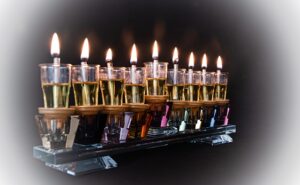
A Human Festival Celebrating Divine Miracle
The fascinating and significant theme of celebrations in the Bible intertwines with its fundamental teachings. In this series of articles, we focus on the festival of Hanukkah, but before delving into it, it’s crucial to distinguish between two general types of celebrations.
When God created the heavens and the earth, on the fourth day, He made the sun, moon, and stars (Gen 1:14). Although the Spanish text isn’t explicit, it reveals that the reason behind this creation was not just to provide light during night and day, but for them to “And let them be for signs and for seasons” (according to the KJV). But what does “seasons” mean here? The Hebrew word is “moed,” meaning ‘an appointed meeting’ or ‘a set time,’ and at times it is translated as ‘festivals.’ Thus, God created the firmament as a guide for specific gatherings with Him, celebrated festively, therefore considered festivals.
Parallel to the “moedim” (plural of “moed“), there are celebrations that may arise from God’s heart without being a “moed,” and also those arising from human desire, whether to commemorate something God did among them, something they do for God, or simply something special they wish to highlight. This type of celebration is simply called a ‘festival’ in Hebrew: “chag.” Thus, every “moed” is a festival, but not all festivals are a “moed.” We have “moedim,” which originate from God’s heart and are festivals, and also festivals that are not necessarily a “moed.”
It is important to note that not all festivals arising from human hearts are good, as we know the heart of man is deceitful (Jer 17:9). However, God has granted freedom for man to create these celebrations from the abundance of his heart. He uses each “moed” as a reference, allowing through this freedom the creation of celebrations that glorify Him. How do we know of this freedom? Simply put: God has not forbidden it, as evidenced by the case of Mordecai and Esther instituting the feast of Purim (Esther 9:20-22), always staying clear of the pagan ways of the Gentiles (Lev 18:3).
After understanding the difference between “moed” (celebration in a time cycle established by God) and “chag” (festival), we can place the festival of Hanukkah. This festival has a particularity that distinguishes it from Purim: God established that when an object was consecrated for God’s service, it must be ‘dedicated,’ translated from the Hebrew word “hanukah.” Whenever the people of Israel performed “hanukah” for something (Num 7:10; 2 Chr 7:9; Neh 12:27), it was done with great respect and solemnity, preparing everything for God’s service.
However, two centuries before Jesus’ birth, an extraordinary event occurred during the dedication ceremony of the Temple in Jerusalem, due to its “seizure” by one of the Greek kings. This led the leaders to institute a festival to commemorate such events. Thus, in that special “hanukah,” which commemorated several “miracles,” the “divine light,” and above all, the “salvation” of their people, emerged the festival known as Hanukkah.
In the next article, we will explore the historical events that marked that special “hanukkah” that made it extraordinary.
Author: Dr. Liber Aguiar
This article sheds more light on what I had understood about this celebration. Thank you so much